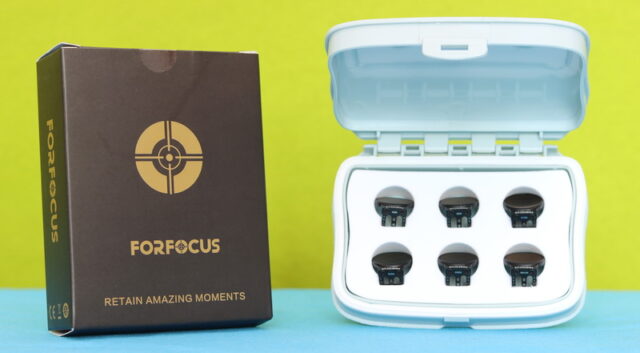If you’re anything like most new Autel Nano owners, you’re likely already searching for compatible accessories such as chargers, cases, spare batteries, or ND filters. In this review, we will have a closer look at the ForFocus Autel Nano filter kit.
Neutral-Density (ND) filters are optical glasses that are placed in front of the camera lens to obtain particular effects. The advantage of an ND filter is that it reduces the amount of light getting through the sensor of your camera. Fixed ND filters come in a range of densities in order to meet the needs of the photographer and the conditions they might be shooting in. In addition to using ND filters for daytime water photography, they can also be used to take better urban night shots.
To cover all light conditions, ForFocus’ neutral density filter kit comes with six filters of different ND values. Below there is an ‘ND filter chart’ that gives you recommendations of usage.
Main features
- All Day Kit: FORFOCUS offers everything you need from sunrise to sunset. The ND kit consists of ND4, ND8, ND16, ND32, ND64, ND1000 filters;
- Optics: High-quality optical glass;
- Lightweight: Made of aviation-grade aluminum alloy;
- Compatibility: Autel Evo Nano and Evo Nano Plus
FORFOCUS ND filters kit review
Disclosure: I received this ForFocus filter kit as part of a product review collaboration with RCGoing. Although the filters were offered for free, all the opinions in this review remain my own!
The filters come in a solid plastic case sitting in a soft foam angled upwards to ensure the lenses do not touch anything and they won’t move around while in transport. The case is small enough to fit in a drone backpack or even in your pocket. Each filter is labeled so you know which one you want to remove. The manufacturer also includes a cleaning wipe for maintenance in the box.
When I tried to remove one filter, I bent it. Being made from some thin aluminum alloy, it deforms easily. The filters have a circular shape, and the mounting part is attached to the filter frame using two tiny screws.
As you can read in my Autel EVO Nano+ review, its gimbal has vent holes on top and the bottom, the filter’s ‘claws’ can be inserted into these holes. Initially, I attached the ForFocus filter to the bottom holes. It passed the gimbal initialization, but, when the drone was in the air, the gimbal shut it down itself. On the second attempt, I mounted the ND filter on the top. This time worked well, with no issue due to the extra weight.
Price and availability
As I previously mentioned, ForFocus is RcGoing’s home brand, and you can find these filters only on their website. The 6-filter kit is available for $69.99 or each individual filter for $18.99. For $13.54, they also have a cleaning kit to remove dirt from optical surfaces.
ND filter chart
| Filter factor number | Light Reduction | Light Transmission | Suitable for |
| ND1000 | 10 f-stops | 0.10% | Harsh light |
| ND64 | 6 f-stops | 1.56% | Extremely sunny days |
| ND32 | 5 f-stops | 3.12% | Very bright days |
| ND16 | 4 f-stops | 6.25% | Partly cloudy days or early to mid-morning |
| ND8 | 3 f-stops | 12.5% | Mostly cloudy days or approaching sunset |
| ND4 | 2 f-stops | 25% | Minor reduction in brightness |
The first screenshot below was taken without an ND filter, ISO of 100, an aperture of f/1.9 (fixed on Nano+), and a shutter speed of 1/4000 seconds. The second picture was taken using the ND16 filter, the third one with ND64, and the fourth one with ND1000 filter. With ISO and aperture remaining the same, the shutter speed modifies to 1/200 seconds in the case of ND16, 1/60 seconds for ND64, and 1/3 for ND1000.
If you opt for a too-high ND value, there will be too much blur, or you will need to compensate with a higher ISO value (grainy results).
ForFocus vs. FreeWell ND filters
FreeWell and ForFocus are the first brands offering ND filters for the Autel Nano series. While FreeWell is a well-known brand since 2012, ForFocus is a newcomer in the filters market. Both manufacturers include six filters in their kit, even with the same ND values. While the FreeWell filters have a rectangular shape and are made from plastic, the ForFocus filters have a circular shape and are made from metal.
Being a more trusty brand, the FreeWell Autel kit is $30 ($99.99 vs $69.99) more expensive than the ForForcus one.

Visitor Rating: 3 Stars
Visitor Rating: 4 Stars